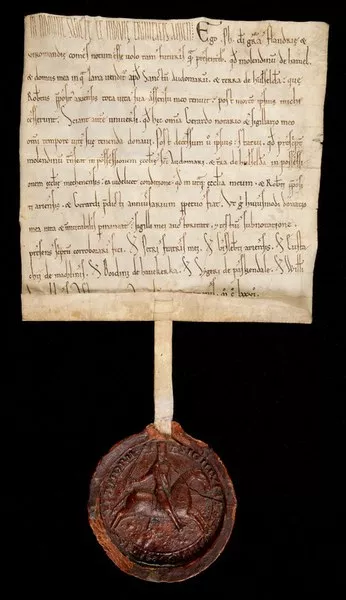
Jean-François Nieus is a senior researcher at the FNRS, professor at the History Department of UNamur and director of the PraME research centre of the PaTHs Institute. His work focuses on princely power and seigniorial domination during the Middle Ages in the county of Flanders and its periphery. He is particularly interested in the administration organised around these great medieval lords and the written and sigillary production that it generated.
In 2016, during a discussion with a historian friend, Samuel Mathot, who is also an enthusiast of medieval seals, Jean-François Nieus' attention was drawn to an entry in an online catalogue of the reserve collections of the Metropolitan Museum of Art in New York. A brief description announces a charter of a Count of Flanders dating from the 12th century. Jean-François Nieus ordered a photo from the famous American institution. When he saw it, there was no doubt: it was a charter from the former Benedictine abbey of Messines (now Mesen, in West Flanders). The archives of this abbey suffered a tragic fate: located on the front line in 1914, the centuries-old establishment was looted and destroyed, and its archives dispersed to Germany.
Jean-François Nieus alerted Thérèse de Hemptinne, professor emeritus at the University of Ghent and also an expert in diplomacy (the science that studies medieval "diplomas", charters and various acts, editor's note). Together they informed the Kingdom's General Archives, which took charge of the case and contacted the Metropolitan Museum, which had been in possession of the precious document since it was donated in 1923 by a private donor. The museum then carried out an in-depth examination of the charter, which confirmed its provenance. It then took the decision - exceptional for this great institution - to hand over the document to Belgium, through the intermediary of the Ministry of Foreign Affairs and Belgian and American diplomatic representatives.
Officially handed over to Minister Hadja Lahbib on 26 January 2023, the deed will soon find its place among the surviving charters of Messines Abbey, kept in the State Archives in Bruges. This news is not only of great interest to scientists and medieval history enthusiasts, it is also causing a buzz in the Belgian media.
A charter that testifies to the status of scribes in the princely entourage
But what is this document about? Jean-François Nieus explains: "This document is interesting for several reasons. Firstly, it bears a magnificent copy of the second seal of Philip of Alsace, who was Count of Flanders between 1157 and 1191, and which shows his coat of arms for the first time. Secondly, it is an evocative testimony to the status enjoyed by the high officials who surrounded the prince. The charter, granted in 1176, details an endowment from the Count of Flanders to the great administrator Robert d'Aire, which was then passed on to his successor Gérard de Messines, notarius et sigillarius meus ("my notary and seal keeper"). The text provides for the future of this endowment after the death of Gérard de Messines: a mill and a building belonging to the count "where wool is sold" will be recovered by the collegiate church of Notre-Dame de Saint-Omer and a piece of land will revert to the abbey of Messines. "We can see that these high officials, professionals in writing and administration, were richly endowed and truly pampered by the prince, a sign of their importance within his entourage," continues Jean-François Nieus. "Having access to the document also allows us to study its material characteristics. Was it drawn up by the nuns of Messines or issued by the count's chancellery? Perhaps it is in the hand of Gerard de Messines himself.
A fruitful collaboration between the PraME centre and the Kingdom's General Archives
The interdisciplinary research centre PraME (Institut PaTHs) has a long-standing scientific collaboration with the Kingdom's General Archives and their provincial repositories. Several books, exhibitions and colloquia have been organised jointly. "The State Archives and UNamur are also partners in the FED-tWIN programme, a new federal research programme that supports collaboration between universities and federal scientific institutions," says Jean-François Nieus. The medieval historian Nicolas Ruffini-Ronzani, the first FED-tWIN researcher at UNamur, shares his time between the PraME centre and the State Archives in Namur. "The discovery and restitution of the charter of the Messines abbey once again underlines the fruitful nature of this collaboration," concludes Jean-François Nieus.